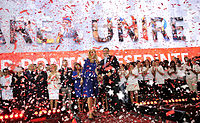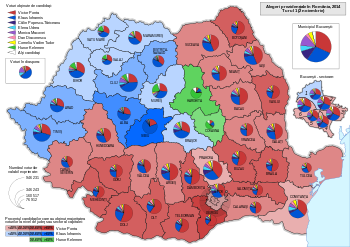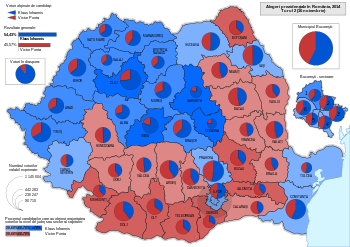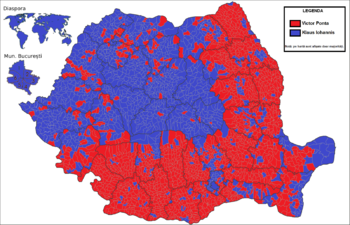2014 Romanian presidential election
[1] Following large protests on how Ponta's government organized the elections in the diaspora, Klaus Iohannis staged a surprising come-back and won the run-off with 54.5%, or more than a million votes than his contender.
Ponta, who had been previously serving as Prime Minister of Romania since May 2012, ran his campaign on promoting an alleged national reconciliation message of a "great union" between all Romanians,[2] defending his governance as balanced, with both progressive and right-wing measures, and promising to end the "era" established by the then incumbent president, Traian Băsescu.
[5] The electoral campaign ran between 3 October and 1 November and was overshadowed by several corruption scandals (Microsoftgate,[6] EADS, illegal retrocessions)[7] involving key figures of PSD,[8] but also the candidate Elena Udrea.
The dates were decided by the government in February:[11] Fourteen candidates submitted to the Central Electoral Bureau files with the number of signatures collected from citizens (at least 200,000) by 23 September 2014: Victor Ponta, Klaus Iohannis, Monica Macovei, Călin Popescu-Tăriceanu, Teodor Meleșcanu, Elena Udrea, Dan Diaconescu, Hunor Kelemen, Zsolt Szilágyi, Corneliu Vadim Tudor, Constantin Rotaru, William Brînză, Mirel Mircea Amariței and Gheorghe Funar.
A number of people announced they would be running was greater, but they failed to gather the 200,000 signatures needed for the submission of the candidature to the Central Electoral Bureau by the 23 September deadline, such as Ioan Ghișe.
The special guest of the event was the Secretary General of the EPP, Antonio López-Istúriz White, who stated that "Victor Ponta cannot and should not become president of the European Romania".
[50] In his presidential program are mentioned, among others: deepening of the strategic partnership with the United States, allocation of 2% of GDP for defense, 6% for health and 6% for education, restructuring of the management system of EU funds, development of the capital market, keeping the flat tax, return of VAT to 19%, etc.
[51] Iohannis proposes a liberal economy based on competitiveness and prosperity, encouragement of a highly developed agriculture, connection of Romania to the Western world through infrastructure or decentralization, as "vector of modernization".
[63] Others were Sigmar Gabriel (Germany, SPD),[64] Elio Di Rupo (Belgium, Parti Socialiste),[65] Gianni Pittella (Italy)[66] and Martin Schulz (President of the European Parliament).
Many political commentators consider that dissimilar cultural heritage that each of the regions of Romania has is an exponent of the different vote expressed by Transylvania, Banat, Bukovina, Crișana and Maramureș, as opposed to Moldavia, Wallachia and Dobruja.
Many people, especially members and supporters of the opposition,[75][76] consider that the political affiliations of the directors of the main opinion polling firms have a significant impact in their results.
CCSCC published the results of a fictional survey during the European Parliament election of 25 May 2014, at liberal Horea Uioreanu's command, subsequently taken into custody for corruption.
In Paris, London, Chișinău, Munich, Stuttgart, Vienna, Turin and other cities, Romanians expressed their dissatisfaction concerning the hindering of the voting process and closure before 9 p.m. of the polling stations.
Counter-protests organized by sympathizers of PSD also took place in Galați, Alba Iulia, Bistrița, Bacău, Craiova and Brașov, but were attended by fewer people.
[87] During a campaign visit at Millenium Hall, Baia Mare, on 6 November, Victor Ponta was booed by hundreds of people protesting against his disinformation and manipulation uttered at his rival, Klaus Iohannis, and condemning the statements in previous days of the premier and ministers Liviu Dragnea, Titus Corlățean and Bogdan Stanoevici regarding the unfolding of voting process in diaspora.
[88] In order to avoid any incidents, Prime Minister Victor Ponta was evacuated from the building by SPP agents and local policemen using a van-minibus.
[90] Poor organization of the second round in diaspora, but also violent dispersal of Romanian voters after the polls closed angered people in Romania that gathered in their tens of thousands in the largest protest against Ponta's government since the demonstrations against the Roșia Montană Project in the autumn of 2013.
[92][93][94][95][96] Ponta did not give a speech at 9 p.m. when the polling ended, and a few hours later he conceded defeat, declaring that "the people are always right" and congratulating Klaus Iohannis over the phone.
[93][97] Cristian Ghinea of the Romanian Center for European Policies considered that "Iohannis did a poor job in the two debates, but Ponta mobilized the people against himself (...) He ran a dirty campaign which blew up in his face",[93] while Sergiu Miscoiu, an analyst, thought that "a major mistake was ostracizing the diaspora".
The candidate of Christian Liberal Alliance, Klaus Iohannis, publicly asked Prime Minister Victor Ponta for the cancellation of Ordinance 45 of 2014, that amends the legislation on presidential elections,[116] affirming that these changes might lead to electoral fraud by favoring multiple voting.
In cities like London, Paris, Madrid, Vienna, Munich, Stuttgart, Turin, Rome or Chișinău huge queues of voters were reported at embassies or other polling stations.
[134] Angry voters staged spontaneous protests in front of the polling stations in Paris, Vienna, London, Madrid, New York City, Strasbourg and many other locations, chanting slogans like "Down with Ponta!
Kilometer-long queues were reported in several European cities, including Paris, Strasbourg, London, Dublin, Brussels, Oslo, Bonn, Munich, Stuttgart, Turin, Rome and Madrid.
Around the same time, Robert Turcescu, a popular television anchor, confessed live on air that he had been an undercover lieutenant-colonel for an espionage service and resigned his post.
Members of PMP and PNL expressed outrage over the announced distribution of 18 kg of food to more than 6.5 million people during the electoral campaign, in October and November.
[153] In a press release, PNL stated that "in the mad rush for votes for presidential candidate Victor Ponta, PSD doesn't have the slightest reluctance to use EU funds for masked electoral bribe".
[154] In a press conference critical to Victor Ponta and Klaus Iohannis, Băsescu mentioned the figure of 4.8 billion euros, money that would go towards electoral alms and will be paid by the population.
[158] The Romanian Post signed contracts with PSD, but also with PMP, Macovei and Tăriceanu, agreeing to send newspapers, catalogs, leaflets, brochures and other electoral advertising materials to homes around the country.
[160] Sebastian Ghiță, PSD deputy and Victor Ponta's fellow, would be part of a pyramidal mechanism of defrauding the 2014 presidential election, according to prosecutors from the National Anticorruption Directorate, Ploiești branch.
[165][166] Investigators also determined that Sebastian Ghiță and his friends would have created a database that included 20,000 Romanian citizens from Moldova, with voting rights in the 2014 presidential election.









